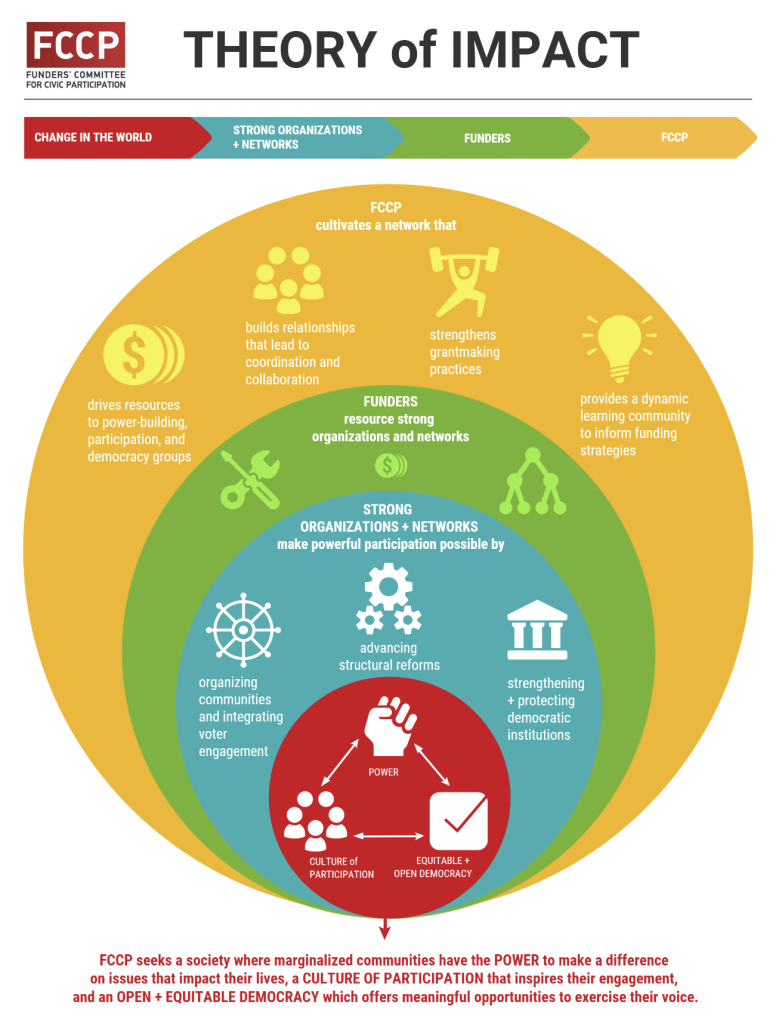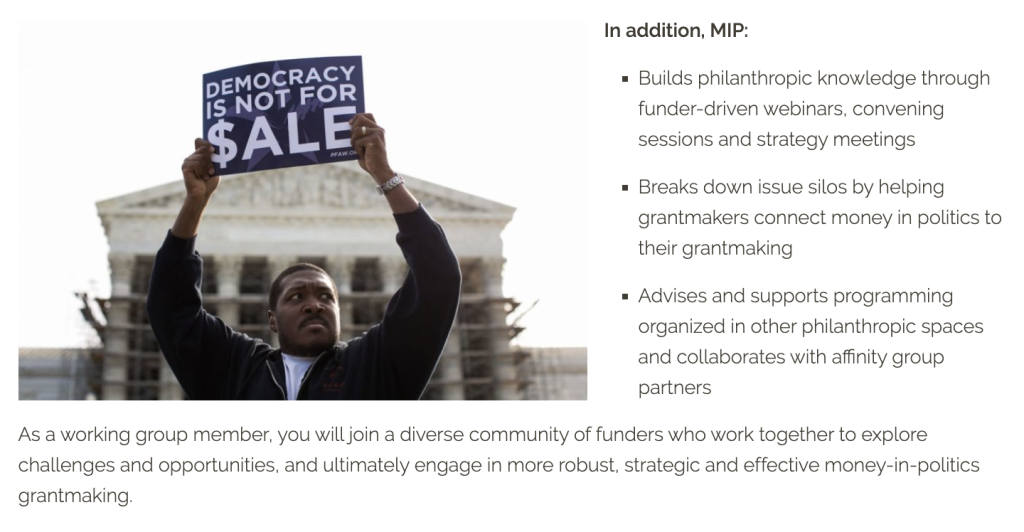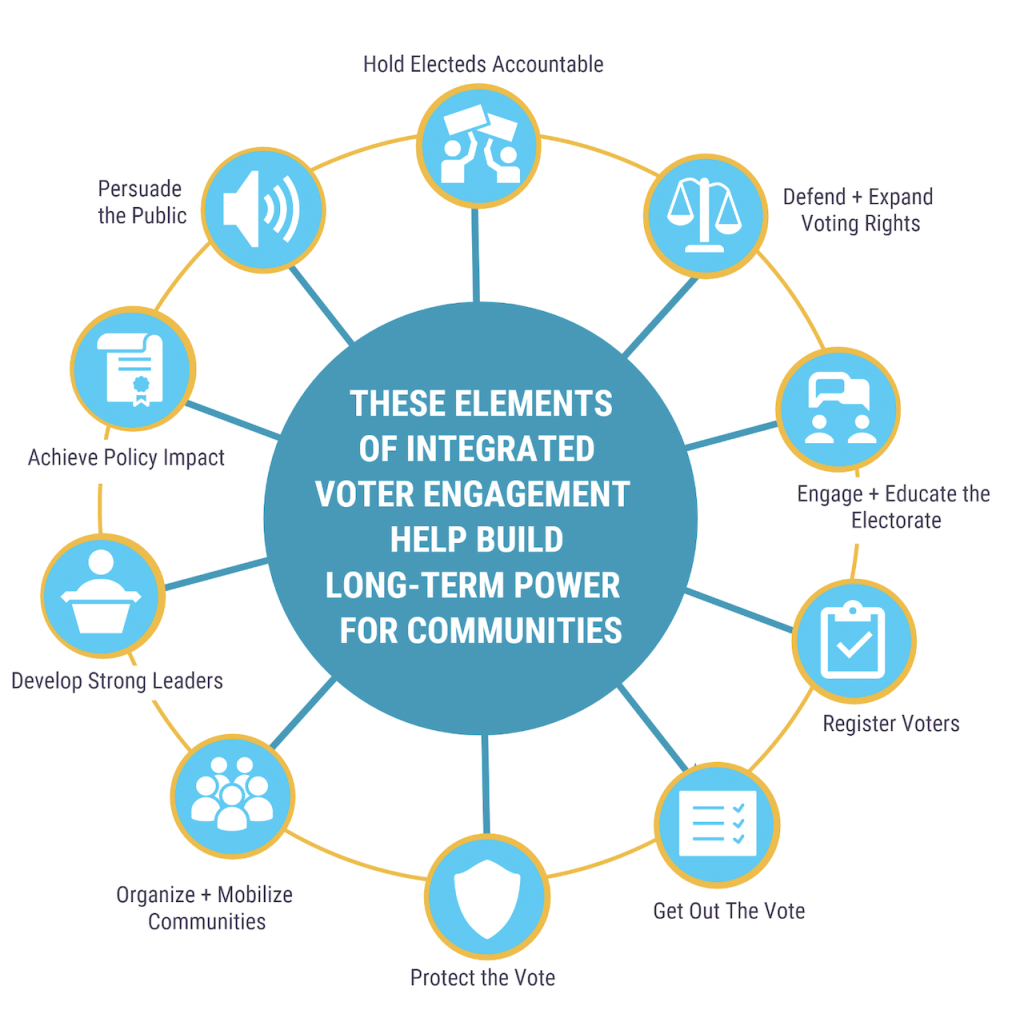The Funders Committee for Civic Participation (FCCP) is a major player in the funding behind civic engagement and elections. FCCP has its hand in almost every aspect of elections, including the 2020 U.S. Census and the resulting redistricting in 2021. FCCP's use of Responsive Philanthropy "helps funders secure the next generation of activists, voters, and grassroots movement leaders."
According to the Capital Research Center, FCCP is not a "genuine nonprofit, but a front for NEO Philanthropy, a 501(c)(3) pass-through funder and leading 'dark money' group that incubates new activist groups." It is essentially a landing spot to help "synchronize the flow of money to leftist political nonprofits."
Its member list includes politically-minded "dark money" donors, labor groups, and other significant organizations that coordinate grants and monies for Left-leaning activist nonprofits and groups. Dark money is defined as not easily traced "contributions of large amounts of money to influence political campaigns."
The Democracy Fund, Open Societies Foundation, Skoll National Education Association, and Arabella Advisors are just a few of the well-known funders. FCCP arguably connects more prominent Left-leaning funders than any other single organization. According to Capital Research, "in 2016 alone, their total combined expenditures exceeded $6 billion, according to their filings with the IRS."
 Member Organizations/FCCP
Member Organizations/FCCP
Responsive Philanthropy
FCCP espouses social-justice-oriented Responsive Philanthropy pushed by the National Committee for Responsive Philanthropy (NRCP). NCRP is yet another organization that coordinates Liberal grant funding organizations. NCRP sees itself as an independent watchdog organization that "intentionally connects [funders and nonprofits] to movements that are important drivers of progress and social change."
Integrated Voter Engagement Is A Cornerstone Of FCCP's Approach
Integrated Voter Engagement (IVE) figures prominently in FCCP's mission. IVE is the methodology used to ensure communities are properly trained and mobilized. IVE is the holistic soup-to-nuts systems approach to identifying communities in need, "building power" by training leaders, and ultimately mobilizing those communities to Get Out The Vote (GOTV).
FCCP has continued to grow since 2016. Eric Marshall, the Former Executive Director of FCCP, said in 2018 that the rapid growth in civic engagement, particularly concerning elections, after the 2016 election is an "understatement," particularly from "disenfranchised communities." Marshall stated:
"We've seen nonprofits and foundations recognize that long-term and sustained investments, particularly in people-of-color-led organizations rooted in underserved communities, are vital. Short-term investments focused on elections, defending democratic institutions, and advancing reforms are critical. But we also need long-term funding outside of election cycles to build power, develop leaders, drive cultural and narrative change, restore and advance the tenets of an equitable democracy, and break down structural racism."
In 2018 FCCP formed a 12-member Theory of Impact Power team to go out into the field "to dig into new research on how communities build and wield power" so that funders would have a clear idea of how to maximize their investment in marginalized communities. The graphic below illustrates the holistic approach to "advancing structural reforms."
 Theory of Impact/FCCP
Theory of Impact/FCCP
One of the goals of this "impact" ecosystem is to reach and influence voters. "FCCP focuses on how organizations come together to collectively cover the range of IVE" since no one organization or funder can address all aspects of the ecosystem. To succeed, it is essential to cultivate "collective power," engage maximum participation in communities, employ all the tools of IVE, and engage funders with its Money In Politics Group (MIP) to advance structural reforms that align with Left-leaning ideologies.
FCCP says its MIP is "an ideal space for funders to share information, engage in strategic discussion, and receive tools to inform grantmaking strategies." MIP is an outgrowth of the 2010 Supreme Court Citizens United v. FEC decision that "ushered in an era of campaign finance deregulation."

 MIP/FCCP
MIP/FCCP
IVE ultimately mobilizes voters on multiple levels, as seen in the FCCP IVE wheel model below. IVE strengthens the "organizational infrastructure and builds resources" during and around election cycles. It is a demonstrably politically biased process:
 Integrated Voter Engagement/FCCP
Integrated Voter Engagement/FCCP
The holistic approach is powerful and can potentially recruit a targeted subset of voters. According to the Capital Research Center, IVE was used in 2005 in Colorado and again in 2008. "The Funders Committee targeted the Colorado Progressive Coalition for funding and organizing efforts using the Integrated Voter Engagement model. The result was thousands of new voters who helped the coalition suspend the Colorado Taxpayers Bill of Rights in a referendum, opening the floodgates to greater state spending. The next year the Colorado Progressive Coalition followed up with a successful ballot initiative campaign to raise the Colorado minimum wage. In 2008, the coalition struck again, using the Funders Committee model to defeat a ballot initiative barring race- and sex-based affirmative action."
IRS rules state a 501(c)(3) nonprofit may engage in activities such as voter registration or voter engagement activities, such as the 2020 Census, so long as it doesn't cross into partisan politics. It seems to be a stretch to argue that organizations like FCCP do not cross over into partisan territory.
This column is the sixth in a series on nonprofits and their influence and involvement in elections.


